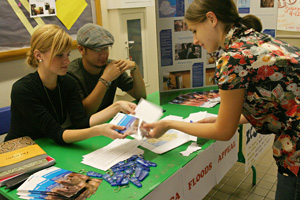Before sunrise, Ethiopian women and their daughters begin the day’s trek for drinkable water. For the past four months, what they’ve found is swimming with bacteria and often contaminated with human waste.

This year, torrential downpour has flooded the typically arid region of eastern Africa during its rain season. The floods have affected the country’s supply of usable water.
In response to the problems this has caused, juniors Liz Getman and Aaron King founded IC Safewater, which will fundraise this year to sponsor an Ethiopian village in distress.
“This is the time in our lives when we … have the opportunity to begin to initiate action,” King said.
The club will work in conjunction with WaterAid America, an international nongovernmental organization which will act as its presence in the village IC Safewater sponsors. WaterAid will work with community members to install irrigation and sanitation systems and teach basic hygiene practices.
King said WaterAid focuses on the development of self-sufficient communities where implemented water access and sanitation systems are constructed using local materials and will be sustainable long after aid workers leave the village.
Getman said the rains in Africa have been so severe this season that the land is being washed away. According to WaterAid.org, basic water filtration and sanitation systems have been destroyed in Ethiopia, where only 22 percent of the population has readily available water. The rivers and ponds, already infested with bacteria, have become further contaminated, leading to water-borne disease outbreaks. Getman said more than 200,000 Ethiopians have been displaced because of flooding and the need for water and sanitation systems.
Getman said she became aware of safe-water deprivation while working as a missionary with her church group in Guatemala this summer, where her group provided rural communities with simple water filtration systems. When she returned to Ithaca, Getman and King sought ways to advocate for the issue.
“Every 15 seconds a child dies from water-related diseases,” Getman said, “which translates to over 5,000 children a day dying.”
According to WaterAid.org, the organization has helped 820,000 Ethiopians gain access to clean water, with the help of fellow organizations, since they began funding projects in Ethiopia in 1983. By 2010, they aim to grant 100,000 people clean water access and 95,000 people sanitation access and hygiene education each year.
Junior Krishna Ramgopal, a group member, said lack of clean water in so many countries is a problem the media have overlooked, and consequently, many students are not aware of the need for the aid IC Safewater hopes to provide in developing countries.
“Clean water is a basic human right,” Ramgopal said.
In December, Ten Thousand Villages, a fair trade store on the Commons, will hold its annual holiday sale in the Campus Center and donate half of the profits to IC Safewater, store manager Curt Bayer said.
Bayer said the store makes an effort to aid community service groups like IC Safewater. The store sells items made by artisans worldwide, including grass baskets, textile items and jewelry from Ethiopia.
Bayer said Ten Thousand Villages supports approximately 95 families through sales every year.
Maria DiFrancesco, assistant professor of Spanish and IC Safewater adviser, said becoming involved in the cause has forced her to reconsider her everyday water expenditure.
“We waste so much water, and we just have no idea how the little things that we could do in our everyday lives could save this great resource,” she said. “Look at the amount of bottled water we use when our drinking water is just as potable and just as healthy.”
Americans live in a wealthy society, said Getman, in which clean water and access to sanitation facilities are taken for granted. She and King said they hope students at least recognize the vital need for water and sanitation access in developing countries as they initiate their campaign.
“[African humanitarian issues] that have come to the attention of the American media have been things that started with grassroots recognition, like Darfur,” King said. “That issue rose to prominence in the American consciousness because it started from the ground up.”
Getman and King anticipate that students will not only be compelled to aid the cause in which they so strongly believe, but might also find other ways to contribute to local or international communities. They hope students recognize the pivotal role clean water and sanitation systems serve in world poverty reduction.
“Even though a problem is so far away and seems too foreign to us,” King said, “my hope for the group is to make people recognize the world isn’t quite as big as it seems.”
For more information, go to www.wateraid.org.







